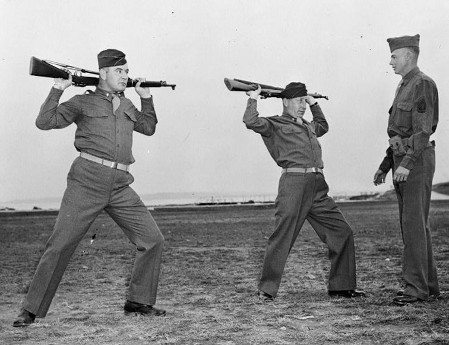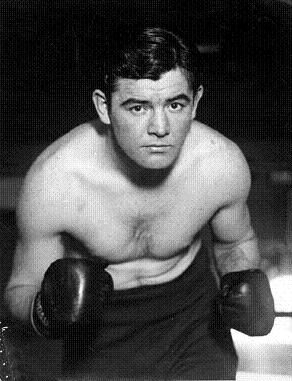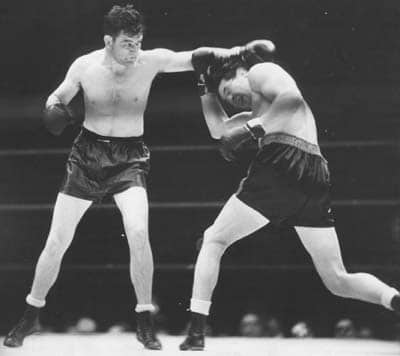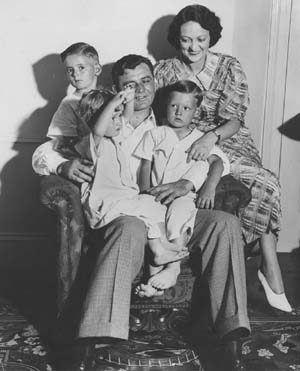Boxing has always lent itself to metaphor. The idea of two men, squaring off toe to toe, battling with only their fists becomes an easy stand in for the life struggles of every man. Perhaps no boxing story has transcended the literal nature of the sport to become a grand symbol more than the story of James J. Braddock. His rise, fall, and comeback paralleled the struggle and hope of an entire nation. He was the man who rose from relief to royalty and inspired every man who was down on his luck and hoped to get back on his feet.
By 1929, James J. Braddock was an up and coming star in the sport, fighting for the light heavyweight title. But after his loss to Tommy Loughran, Braddock’s career and life took a turn for the worse. He lost 16 of his next 26 fights. From being a contender for the light heavyweight title at Madison Square Garden in front of tens of thousands of fans, Braddock slipped to fighting two-bit opponents in tiny clubs with an audience in the hundreds. He was booed and jeered by the crowds and skewered in the press by acerbic writers. He then broke his only good hand-his right-and “retired†from the sport. At the same time, Braddock lost the money he invested in a failed bank and taxi cab company. Like millions of other Americans, he was out of work and out of money.
Without an education or a skill beyond boxing, Braddock searched for work of any kind to support his wife and 3 kids. Daily he would walk the 3 miles to the docks of Weehawken and Hoboken to see if work could be found. If there was, he would spend the day unloading railroad ties. If there wasn’t, he would walk another 2 miles to West New York. If there wasn’t any work to be found there either, he’d walk home to try to find some odd jobs like shoveling snow. It wasn’t unusual for him to walk 10-12 miles a day in search of a way to put food on his family’s table. His neighbors, who used to stop and shake his hand and slap his back, now crossed to the other side of the street when they saw him coming. He poured drinks at an athletic club for guys who used to take pride in his rise to prominence and now simply pitied the sad man behind the bar.
After 9 months without a fight, Braddock landed a bout against Corn Griffin. Although he was picked to be an easy win for Griffin, Braddock pummeled his opponent, causing the ref to stop the fight in the third round. From there Braddock won bouts against John Henry Lewis and Art Lasky and secured a spot fighting Max Baer for the heavyweight championship. His “fairytale” journey to being crowned the champ won him the name of “Cinderella Man” and is full of lessons for every man.
Always be ready for an opportunity. When Braddock’s manager, Joe Gould, found Braddock to tell him he had secured him a spot against Corn Griffin, Braddock hadn’t fought in 9 months. But at age 29, he was in the best shape of his life from his constant walking and work on the docks. Though he had only 2 days to prepare, he didn’t hesitate to accept the bout. “Two hours-or an hour-would have been enough,†he later said.
Gould and Braddock thought that his win over Griffin would immediately create more matches for Braddock, but no further opportunities emerged for 4 months. But Braddock stayed ready, working out hard at the famous Stillman’s gym daily. And when Braddock finally got the chance to fight again, he was ready.
 Jimmy and Joe did everything together. Including joining the army during WWII.
Jimmy and Joe did everything together. Including joining the army during WWII.
Surround yourself with the right people. James Braddock and his manager Joe Gould were a study in contrasts. The Irishman was tall, brawny, modest, and quiet. Gould was a hot-tempered, short Jewish talker, who loved flashy things and the art of promotion. A man who hopes to be successful must surround himself and partner up with the right men, and Braddock’s pick of Gould to guide his career was impeccable. Braddock was generally quiet and avoided the limelight, and he relied on Gould to constantly talk up his abilities and harass anyone who would listen into getting Jimmy a fight.
Gould was absolutely loyal to Braddock. When his career hit the skids, Jimmy told Gould to go find some other, more profitable fighter to manage. But Gould refused. Even when evidence was scant, Gould always believed in Braddock’s potential, that he could turn it around and whip any comer. It was Gould’s unflagging persistence that secured Braddock his match with Corn Griffin and then his subsequent opponents. Sports writer Jack Kieran said:
“A fight manager is a human harpy who squeezes all he can out of the blood and bones of husky and courageous young fellows and then tosses them callously aside when they are battered hulks of no more financial advantage for him. But there are exceptions. Jim drew one of the exceptions in Joe Gould.â€
Work your ass off for what you want. When Braddock secured a chance to battle for the title against Max Baer, he secluded himself in the Catskill mountains to prepare for the fight. His routine was rigorous and disciplined. He ran 8 to 10 miles every morning, then shadowboxed and jumped rope, sparred, and shadow boxed some more.
The press dubbed his training camp “Homicide Hall†as Braddock’s training regimen was more brutal than anything they had ever covered. Gould had brought in the very best sparring partners available, and he threw a fresh one at Braddock with every round, constantly keeping the boxer on his toes. And the sparring went all out. Writer Paul Gallico said:
“James J. has the toughest crew of spar boys ever assembled at any heavyweight’s training camp, and from 4 to 4:45 every afternoon, he amuses himself by prizefighting with them. And when I say prizefighting, that is also what I mean. For this business that goes on by the bonnie banks of Lock Sheldrake can by no stretch of the imagination be called sparring. It is fighting pure and simple. It is really the screwiest training camp you ever saw.â€
This vigorous routine coupled with a Michael Phelps-esque diet allowed Braddock to pack on 10 pounds of pure punching power during the camp. The journalists who visited were astounded at his transformation; he wasn’t same boxer they had covered back in ’29. Braddock will never be called one of the greatest boxers of all time; he was slow-footed and ungraceful. But what he lacked in talent and finesse he made up for with gritty resolution.
Turn you weaknesses into strengths. For most of Braddock’s career, only his right hand was effective at delivering blows. His left delivered little punching power. His right hand was constantly sore or fractured, leaving him an impotent and lopsided boxer. When Braddock broke his hand in three places in his fight with Abe Feldman, it seemed like a terrible turn of luck. But oftentimes our trials can turn out to be for our benefit. When Braddock worked at the docks during his “retirement†he was forced to use his left hand while his right hand healed. This greatly strengthened his left hand and when he returned to boxing, he found that his jab had finally turned into a potent and powerful weapon.
Instead of ignoring your weaknesses, work on overcoming them and sometimes they can become your greatest strengths.
Be confident. Braddock was never nervous when he climbed into the ring. In his bout with Baer, Maxie expected him to spend the first round anxious and jumpy, but Braddock came out swinging. His calmness came from an absolute confidence in himself. As a kid he took on any comer, and as a professional he would take any fight he could, criss-crossing the country to find an opponent. He knew he could take even the hardest punch and keep on standing. He had never been knocked out (and wouldn’t be until he lost the title to Joe Louis). And so as one contemporary newspaperman put it, “Serene was Braddock and unafraid. There was about him an inspiring calmness that transcended his ability.†He was so calm before the heavyweight championship that he laid down in his dressing room and took a nice nap. (In contrast, Max Baer was having sex with a woman who was not his girlfriend, a move that infuriated his manger who believed that copulation sapped an athlete’s strength).
Relish being the underdog. The champion has past successes to fuel him, but he often succumbs to hubris and is no match for the hungry, scrappy underdog. A man who is down and out can simply resign himself to always being on the bottom, or he can use his failures to spur his comeback. Braddock chose the latter. The odds on the Braddock/Baer showdown were 10 to 1, the biggest in heavyweight history. Ring Magazine hadn’t even listed Braddock in its top 19 best heavyweights in the country. There were 18 other men who were more highly thought of than him. Yet while Baer dismissed Braddock’s chances, clowning around at his training camp and spending his time mugging for fans instead of sparring, Braddock had the hunger of a man who took absolutely nothing for granted. He thought about all he had been through-the booing crowds, the mercilessly journalists, the injuries, the grinding poverty-and used it as fuel. He wanted to show all the naysayers that they were wrong for writing him off. And in 15 terrific rounds, he did just that.
Embrace personal responsibility. In time where individuals and corporations readily accept, nay even demand bailouts it’s hard to imagine a time where people felt deeply ashamed to accept welfare. For those who lived during the Great Depression, getting on the relief rolls was an absolute last resort, one that made them feel like failures. This was how James J. Braddock felt. He held out as long as he could, trying to make do with his meager earnings from working on the docks. But he was behind in paying the milkman, his rent, and the utilities. He had to move the family into the basement of the apartment building where they lived when then could no longer afford their old flat. The kids were hungry and the winter was long and cold. So he reluctantly put his name on the relief rolls. He was so embarrassed he told only a few close friends and kept it a secret even from his parents. But Jimmy saw the checks he got each month as a loan, not a handout. He carefully kept track of how much he received, intending to pay it all back once he got back on his feet. After he started his comeback and beat John Henry Lewis, he went the next day to have his name taken off the relief rolls. And when he beat Art Lasky, he went to pay back all that he had received. This was unusual, even for the time. But Braddock took honor and personal responsibly seriously.
Fight for your family. Unusual for boxers both then and now, Braddock was a family man with 3 kids. True to his down to earth nature, he wasn’t a flashy playboy like Max Baer. When he met Mae, he knew he wanted to spend the rest of his life with her, and he was a devoted dad to his children. His love for his family pushed him to succeed. He couldn’t stand to see them hungry and suffering. He fought to protect and provide for them. After he won the heavyweight title and made his way back to his dressing room, the large crowd of newspapermen waited for him to speak. An emotional Braddock said, “I’m glad I won because it will please the wife and kids. I’ve got the prettiest kids in the world, and tonight I can go home to them and say, “Your daddy is champ.â€
Later, Mae said, “My husband wasn’t seeing Max at all when he was in the ring fighting. What he saw was a fierce ogre, trying to keep him from chasing the big bad wolf from our door. He was thinking of me, and of the kids, every minute of those fifteen terrific fighting rounds.â€
Listen to our podcast on the rise and fall of the American heavyweight boxer:





